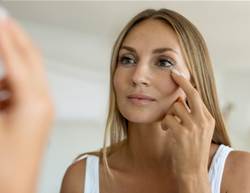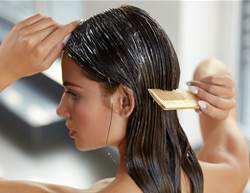When Pamela Anderson rocked up to Paris Fashion Week in September 2023 without a hint of makeup, it made news all around the world. We’re so used to seeing celebrities with complicated, glamorous looks that the no-makeup look in a star over 50 was very unusual, and a breath of fresh air for many.
It was a dramatic change from the heavily edited and filtered images we’re usually bombarded with, says wellness author and entrepreneur Jessica Sepel from JSHealth.
“It’s hard not to get caught up with social media, leading us to change our beliefs on what true beauty really is. Skin isn't perfect. It's natural to have pores, freckles, scars, and sometimes blackheads, pimples, redness or any other characteristic of filter-free skin,” she says.
“Try to remember that heavy makeup, airbrushed and filtered photos are not real and no one was born to look like that."
What is the bare-faced beauty trend all about?
For decades, a full face of makeup has been the standard for feeling put-together and ready to take on the world for women. Lady Gaga and Selena Gomez have been shaking this up (with makeup free performances and social selfies respectively), as have many other female celebrities. The no-makeup trend is a refreshing shift, says Sepel.
“With celebrities like Alicia Keys and Gwyneth Paltrow embracing bare-faced beauty, this movement encourages you to glow in your natural radiance and prioritise healthy, cared-for skin over heavy makeup application. It’s about feeling comfortable and confident in the skin you’re in,” she says.
How to master the no-makeup skin trend
This trend requires devotees to ditch the foundation and lipstick and adopt a dewy, fresh-faced look. But how do we achieve glowing skin that looks great without makeup, naturally?
“I’m a strong believer that true beauty starts from within and how we choose to nourish our bodies with nutrients everyday,” says Sepel.
Here are her top tips for nailing the natural beauty trend, from the inside out.
Hydrate, hydrate, hydrate
“Our skin is a thirsty organ (and is our largest organ too!). Aim for two litres of water daily. Include hydrating fruits and vegetables into your diet such as watermelon, cucumber and celery. Drinking plenty of water throughout the day keeps your complexion supple and firm,” she says.
Omegas are your best friends
“Omega-3 and omega-6 fatty acids are essential for healthy skin cell function. Include oily fish (salmon, tuna), flaxseeds, chia seeds and walnuts in your meals," she says.
Studies have shown that omega-3s may seal in moisture and help protect against sun damage, reduce acne and guard against dry or itchy skin.
A rainbow on your plate
Free radicals accelerate the ageing process, and antioxidants may prevent some of the damage caused by free radicals by neutralising them, reports Better Health Victoria.
“Tropical fruits such as mango and papaya, and green, leafy vegetables like spinach and kale are packed with antioxidants that fight free radical damage and support a true lit-from-within glow," says Sepel.
Load up on healthy fats
“It’s so important to consciously include healthy fats into your meals. Think avocado, olive oil and nuts. These fats nourish the skin from within, keeping it plump and glowing," she says.
In one study, olive oil intake was found to help reduce the impact of sun damage on your skin.
Prioritise quality sleep
Aim for 7-8 hours of quality sleep each night. As you sleep, your skin uses this time to repair and regenerate.
One small study reported that good sleepers had better skin barrier recovery and showed less skin ageing than poor sleepers.
Manage your stress levels
Chronic stress has a big impact on your skin. In fact, stress can trigger and worsen skin conditions like psoriasis or eczema.
“I’m a big believer in practising stress management techniques and making sure you enjoy life with everything you have. Try gentle yoga, meditation or even spending time in nature with a 10-minute walk outside. I love to swim, the water is truly where I find my peace.”
Build your confidence
Remember that perfect doesn’t exist, says Sepel.
“Building confidence in your natural beauty is a journey, and it starts with showing yourself compassion.
“Practise self-care, such as a regular skincare routine to show yourself that kindness you deserve. It sounds cliché but it really works. This will help to build your confidence within, which always shines through on the outside.”
Wear sunscreen
Although this beauty trend is about less is more, that doesn’t apply to sun protection. The skin benefits and anti-ageing benefits simply can’t be overestimated. Wear sunscreen every day, particularly in the warmer months.

Which foods can help us get glowing skin?
A balanced diet with lots of fruits and vegetables has been linked to healthy skin.
Plant-based foods and a powerhouse of nutrients – they contain dietary fats and vitamins that work wonders for skin health.
Avocados: Rich in healthy fats, avocados can help to maintain moisture in the skin, giving it a youthful, glowing appearance. Research has shown the benefits of avocados on skin health, including skin elasticity.
Berries: These little gems are packed with antioxidants, which fight free radicals. Free radicals can advance the ageing process. Berries may also help lower inflammation in the body.
Add berries to a smoothie, cereal or much on them at snack time.
Nuts and seeds: Sources of vitamin E, selenium and omega-3 fatty acids, nuts and seeds are essential for maintaining skin health and preventing dryness.
Sweet potatoes: Beta-carotene may help with skin health, likely due to its antioxidant properties, reports Healthline.
“High in beta-carotene, sweet potatoes can help prevent skin ageing,” says Sepel.
Green tea: “Known for its anti-inflammatory properties, green tea can reduce redness and irritation, promoting a more even skin tone.”
Research on green tea supports its benefits for skin health. In one small study, women who drank green tea polyphenols every day for 12 weeks had smoother and more elastic skin than women who didn’t.
Fatty fish: Salmon, mackerel and herring are great sources of omega-3 fatty acids, which are crucial for keeping the skin thick, supple and moisturised.






.jpg&h=193&w=250&c=1&s=1)


